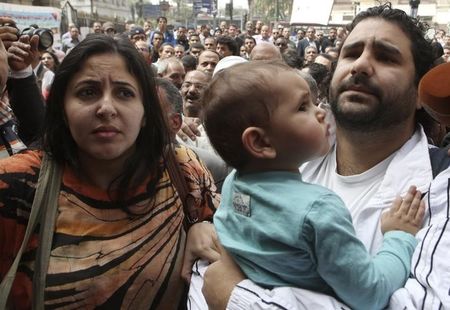CAIRO (Reuters) - An Egyptian judge ordered 21 democracy activists to be arrested on Monday at the start of their retrial for breaking a law against protests passed after the military ousted former President Mohamed Mursi last year.
The activists - including leading campaigner Alaa Abdel Fattah - chanted "down with military rule" and "down with the military judiciary" from their courtroom cage after the judge read out his decision.
The defendants, plus four more who did not show up, had been sentenced to 15 years in absentia last June for violating a 2013 law curbing the right to public protests, which rights groups have denounced as repressive.
They were later arrested, which under Egyptian law meant they had to be tried again in person on the same charges. That trial collapsed on Sept. 15 when the presiding judge stepped down and all 25 were freed on bail pending a new retrial.
The court also ordered arrest for the four absent defendants.
Abdel Fattah is a well-known secular figure prominent in the 2011 revolt that toppled former president Hosni Mubarak. He has been in and out of jail since then, missing the birth of his child and the death of his father Ahmed Seif al-Islam, himself one of Egypt's best-known human rights activists.
The protest law, passed last year after the army toppled elected Islamist President Mohamed Mursi of the Muslim Brotherhood, tightly restricted the kind of demonstrations that ousted Mubarak and stoked a popular movement against Mursi.
It gave the interior ministry the power to ban any public gathering of more than 10 people and added to fears that freedoms won during the 2011 uprising were being rolled back.
The detention of the defendants came as Egypt expands the jurisdiction of military courts to try civilians accused of attacking state facilities or blocking roads.
Two such attacks in the Sinai peninsula at the weekend killed at least 33 security personnel in one of the worst assaults on security forces since Mursi's ouster.
In the 15 months since Mursi's ouster, security forces have rounded up thousands of Brotherhood supporters and courts have sentenced hundreds to death in mass rulings that have drawn criticism from human rights groups and Western governments.
Egypt's secular activists have also found themselves on the wrong side of the new regime.
On Sunday, an Egyptian court jailed 23 young activists for three years for violating the demonstrations law, including Abdel Fattah's younger sister Sanaa, a 20-year-old university student.
Outside the courtroom before the verdict was read, Abdel Fattah said rulings against young activists like his sister were a deliberate attempt to imprison and silence them.

The judge set Nov. 11 as the date of the next hearing.
(Reporting by Lin Noueihed and Mahmoud Mourad; Editing by Tom Heneghan)
